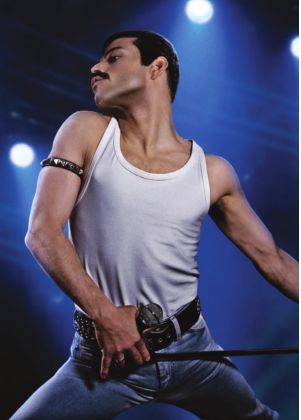It is with great regret that I report that
Bohemian Rhapsody is not the film Queen fans have been waiting for, nor is it the one the band deserves.
A rote exercise from the start, this by-the-numbers biopic is a thumbnail overview of the highs and lows the London quartet endured, playing out in such a predictable manner that their journey comes off as nothing but a collection of clichés. The film never delves deep enough into what made the band tick, showing us their efforts to score their next big hit and little else. And yet there’s the music and the titanic performance from Rami Malek as Freddie Mercury that nearly saves the entire endeavor, ensuring that viewers are never bored and repeatedly tapping their feet.
Beginning with a backstage glimpse of their seminal 1985 performance at Live Aid, the film plays as an extended flashback, going 15 years in the past to quickly show us Mercury’s clashes with his father, his initial meeting with bandmates Brian May (Gwilym Lee) and Roger Taylor (Ben Hardy) and the love of his life, (Lucy Boynton) Mary Austin. These events trip on the heels of one another and set up the template of the movie – a quick nod to the most important points of Mercury and the band’s story without providing much background before moving on to the next.
While the scenes in which we see the recording sessions for Bohemian Rhapsody, We Will Rock You and others are entertaining, we never witness the spark of inspiration for any of them, just the end result and nothing else. And while it’s expected that Mercury be the focus of the movie, even his life isn’t given the full treatment it deserves. His alienation from the band, Austin and his family seemingly happens overnight and simply as a matter of course, while his inner conflict concerning his sexuality is seen as a plot point rather than the tragedy that would regrettably come to define his public persona.
That’s not to say that the film doesn’t have its moments. A meeting with EMI Records executive Ray Foster (Mike Myers) about the release of the album A Night at the Opera results in a brilliant post-modern joke; the music remains exciting and distinctive; and Malek is remarkable as are Lee, Hardy and Joseph Manzello as John Deacon. These four are completely convincing as musicians, bringing an authenticity to their performances that makes us believe we’re watching them play the songs that rocked a generation. There’s never a moment in which the quartet is faking or phoning it in when armed with their guitars or sitting behind a drum kit.
Of course, Malek is the focal point and he doesn’t disappoint. The actor accepts the challenge the role presents and fully embraces it, assuming Mercury’s larger-than-life persona and bringing it to life in a way so that he dominates the screen just as his character ruled the stage. It’s a tour de force and almost worth the price of admission.
Rhapsody’s final half hour is a blur, as screenwriter Anthony McCarten rushes to tie up as many loose plot threads as possible during one very busy day, which includes the band’s turn at Live Aid. The near-full recreation of this set, a full 20 minutes of screen time, is the movie’s highlight and reminds us not simply of how entertaining Queen’s music is but of its power to unify as well. It’s a rousing, chill-inducing end to a film that, unlike its subject, shies away from breaking any new ground.
Contact Chuck Koplinski at [email protected].